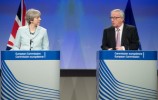Disturbing questions remain about dirty war
Seven years on and at a cost of some £40 million, the interim report of Operation Kenova has finally landed. Its content is explosive but not unexpected. The language of the document is blunt, honest and a brutal read, laid out in black and white.
Jon Boutcher, his investigative team and, latterly, Ian Livingstone deserve much praise for their tenacity, determination and doggedness. They challenged the Deep State and have survived to tell the tale.
PSNI Chief Constable Jon Boutcher (right) and temporary Deputy Chief Constable Chris Todd leave a press conference at Stormont Hotel in Belfast following the publication of the Operation Kenova Interim Report (Liam McBurney/PA)Other external investigations, like that headed by the late former deputy Chief Constable of Greater Manchester, John Stalker, were not so lucky.
Stalker was brought down as he started to unravel the murderous threads of murky relationships between the RUC Special Branch, Army intelligence and their coordinated collusion with loyalist paramilitaries. He met with resistance and obfuscation at every turn.
Stakeknife
Disturbing questions remain about dirty war after Kenova revelations – Tom Kelly
To his credit, Stalker raised questions which never went away about the rogue nature of........
© The Irish News






















 Toi Staff
Toi Staff Gideon Levy
Gideon Levy Belen Fernandez
Belen Fernandez Warren J. Blumenfeld
Warren J. Blumenfeld Andrew Mitrovica
Andrew Mitrovica Dr Ramzy Baroud
Dr Ramzy Baroud Tarik Cyril Amar
Tarik Cyril Amar Rachel Marsden
Rachel Marsden Tafi Mhaka
Tafi Mhaka
